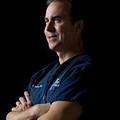If you have sciatica from a lumbar herniated disc, are you wondering whether or not to have surgery? The decision to undergo surgery is never easy to make.
Sciatica treatment usually starts with nonsurgical methods and includes some combination of physical therapy, medications, therapeutic injections, and alternative therapies.
Here are a few useful pointers based on medical research from surgical trials on the overall success of surgeries for sciatica.
Surgery is typically considered after a trial of nonsurgical treatments
While there are no definitive guidelines for surgical indications in sciatica, the following criteria may prompt physicians to recommend surgery to their patients:
- When nonsurgical sciatica treatments, such as oral medications, physical therapy, and epidural steroid injections have been tried for 6 to 8 weeks (or more) without any success. 1 Jacobs WC, van Tulder M, Arts M, et al. Surgery versus conservative management of sciatica due to a lumbar herniated disc: a systematic review. Eur Spine J. 2011;20(4):513–522. doi:10.1007/s00586-010-1603-7
- When neurological symptoms, such as numbness and/or weakness progress and/or interfere with daily activities.
Surgery is typically considered when a surgically treatable condition in the lower back, such as a herniated disc, spinal stenosis, or spondylolisthesis is present. 2 Fernandez M, Ferreira ML, Refshauge KM, et al. Surgery or physical activity in the management of sciatica: a systematic review and meta-analysis. European Spine Journal. 2015;25(11):3495-3512. doi:10.1007/s00586-015-4148-y Surgery is even likelier to be recommended if sciatica is being caused by a cyst, tumor, or spinal cord compression.
Read more about Sciatica Causes
Immediate pain relief and long-term outlook can vary
A few clinical studies comparing surgical and nonsurgical treatments for sciatica have demonstrated greater relief of symptoms and improved function for cases that had surgery. 3 Sedighi M, Haghnegahdar A. Lumbar disk herniation surgery: outcome and predictors. Global Spine J. 2014;4(4):233–244. doi:10.1055/s-0034-1390010 However, after a 1 to 2-year period, and generally in the long term, the effects of surgical and nonsurgical treatments are typically the same. 4 Kumar, M. Epidemiology, pathophysiology and symptomatic treatment of sciatica: A review. nt. J. Pharm. Bio. Arch. 2011, 2. , 5 Gugliotta M, da Costa BR, Dabis E, et al. Surgical versus conservative treatment for lumbar disc herniation: a prospective cohort study. BMJ Open. 2016;6(12):e012938. Published 2016 Dec 21. doi:10.1136/bmjopen-2016-012938
The type of surgery and the underlying medical cause of sciatica play an important role in the surgical outcome. Newer techniques employ minimally invasive procedures, such as microdiscectomy for herniated discs and endoscopically-guided laminectomies for spinal stenosis. Less invasive procedures typically have faster healing time and lesser postsurgical complications compared to open surgeries.
Read more about Sciatica Treatment
In This Blog Series:
- Is My Pain Sciatica or Something Else?
- 4 Commonly Overlooked Sciatica Remedies
- Is Surgery the Quickest Path to Sciatica Relief?
Surgery for sciatica is relatively safe but may have risks
While surgery for sciatica typically provides pain relief in appropriately selected candidates, about 8% of people who undergo this surgery may require a second surgery within 2 years. 2 Fernandez M, Ferreira ML, Refshauge KM, et al. Surgery or physical activity in the management of sciatica: a systematic review and meta-analysis. European Spine Journal. 2015;25(11):3495-3512. doi:10.1007/s00586-015-4148-y
When sciatica surgery fails to offer relief, it is typically due to one or more of the following factors 2 Fernandez M, Ferreira ML, Refshauge KM, et al. Surgery or physical activity in the management of sciatica: a systematic review and meta-analysis. European Spine Journal. 2015;25(11):3495-3512. doi:10.1007/s00586-015-4148-y , 6 Lucas AJ. Failed back surgery syndrome: whose failure? Time to discard a redundant term. Br J Pain. 2012;6(4):162–165. doi:10.1177/2049463712466517 :
- Inaccurate primary diagnosis
- Post-surgical complications
- Psychological factors
- Overall health of the patient
- Skill of the surgeon
A failed surgical outcome is also possible after a structural abnormality has been corrected. For example, the surgeon would have successfully corrected the herniated disc, but the patient may experience continuing or worsening pain, which indicates that the pain may not have originated from the herniated disc to start with.
See Failed Back Surgery Syndrome (FBSS): What It Is and How to Avoid Pain after Surgery
The decision of when and if you want to have surgery for sciatica is a personal one. Reading and understanding as much as you can about the types of surgery and nonsurgical care available for your medical condition, and carefully researching a surgeon, will go a long way in helping you make a well-informed decision that is best suited for you and your situation.
Learn more:
Microdiscectomy Spine Surgery: Risks, Complications, and Success Rates
- 1 Jacobs WC, van Tulder M, Arts M, et al. Surgery versus conservative management of sciatica due to a lumbar herniated disc: a systematic review. Eur Spine J. 2011;20(4):513–522. doi:10.1007/s00586-010-1603-7
- 2 Fernandez M, Ferreira ML, Refshauge KM, et al. Surgery or physical activity in the management of sciatica: a systematic review and meta-analysis. European Spine Journal. 2015;25(11):3495-3512. doi:10.1007/s00586-015-4148-y
- 3 Sedighi M, Haghnegahdar A. Lumbar disk herniation surgery: outcome and predictors. Global Spine J. 2014;4(4):233–244. doi:10.1055/s-0034-1390010
- 4 Kumar, M. Epidemiology, pathophysiology and symptomatic treatment of sciatica: A review. nt. J. Pharm. Bio. Arch. 2011, 2.
- 5 Gugliotta M, da Costa BR, Dabis E, et al. Surgical versus conservative treatment for lumbar disc herniation: a prospective cohort study. BMJ Open. 2016;6(12):e012938. Published 2016 Dec 21. doi:10.1136/bmjopen-2016-012938
- 6 Lucas AJ. Failed back surgery syndrome: whose failure? Time to discard a redundant term. Br J Pain. 2012;6(4):162–165. doi:10.1177/2049463712466517










